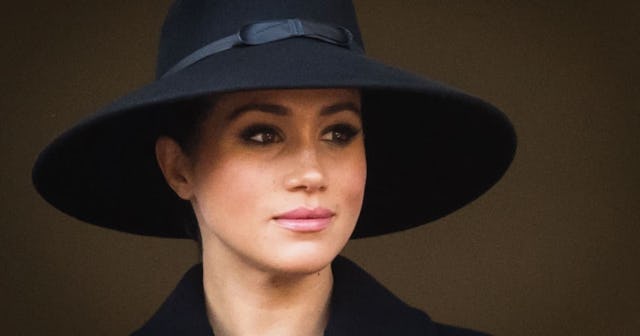Meghan Markle Reveals Recent Miscarriage In Powerful Essay

In an essay for “The New York Times,” Meghan Markle opens up about the loss she and Prince Harry experienced earlier this year
In a powerful essay for The New York Times, Meghan Markle, Duchess of Sussex, reveals she and Prince Harry suffered a miscarriage in July of this year.
“It was a July morning that began as ordinarily as any other day: Make breakfast. Feed the dogs. Take vitamins. Find that missing sock,” she writes. “Pick up the rogue crayon that rolled under the table. Throw my hair in a ponytail before getting my son from his crib.”
Markle describes feeling “a sharp cramp.”
“I dropped to the floor with him in my arms, humming a lullaby to keep us both calm, the cheerful tune a stark contrast to my sense that something was not right,” she says. “I knew, as I clutched my firstborn child, that I was losing my second.”
“Hours later, I lay in a hospital bed, holding my husband’s hand,” she writes. “I felt the clamminess of his palm and kissed his knuckles, wet from both our tears. Staring at the cold white walls, my eyes glazed over. I tried to imagine how we’d heal.”
Markle recalls the famous moment during the couple’s 2019 tour of South Africa when a reporter interviewing the actress asked, “Are you ok?” Her honest answer, she acknowledges, resonated with mothers everywhere.
“My off-the-cuff reply seemed to give people permission to speak their truth,” she writes. “But it wasn’t responding honestly that helped me most, it was the question itself. ‘Thank you for asking,’ I said. ‘Not many people have asked if I’m OK.'”
Now, Markle ties her heartbreaking loss to the horrific year we’ve all endured. “Sitting in a hospital bed, watching my husband’s heart break as he tried to hold the shattered pieces of mine, I realized that the only way to begin to heal is to first ask, ‘Are you OK?'”
Markle details the gut-wrenching experiences that, in 2020, have become sickeningly common. Losing a parent unexpectedly, falling ill and dying mere days later, the deaths of Breonna Taylor and George Floyd forcing America to contend with its long history of systemic racism. “Peaceful protests become violent. Health rapidly shifts to sickness,” she writes. “In places where there was once community, there is now division.”
She outlines the ways this country has divided itself in recent years. “We aren’t just fighting over our opinions of facts; we are polarized over whether the fact is, in fact, a fact. We are at odds over whether science is real. We are at odds over whether an election has been won or lost. We are at odds over the value of compromise.”
Markle recounts an experience in her teens, riding in a cab in NYC and spotting a woman crying on the sidewalk. She recalls asking the driver if they should pull over and see if she’s ok. He told her not to worry, that someone would eventually help her and ask if she’s ok. With the pandemic driving us all into isolation, further away from each other than ever, Markle regrets not asking the woman if she needed help. “I wish I could go back and ask my cabdriver to pull over,” she says. “This, I realize, is the danger of siloed living — where moments sad, scary or sacrosanct are all lived out alone. There is no one stopping to ask, ‘Are you OK?'”
She notes the stigma surrounding miscarriage — and why she felt compelled to speak out. “In the pain of our loss, my husband and I discovered that in a room of 100 women, 10 to 20 of them will have suffered from miscarriage. Yet despite the staggering commonality of this pain, the conversation remains taboo, riddled with (unwarranted) shame, and perpetuating a cycle of solitary mourning.”
In the end, that’s why she decided to share their own heartbreaking experience. “We have learned that when people ask how any of us are doing, and when they really listen to the answer, with an open heart and mind, the load of grief often becomes lighter — for all of us. In being invited to share our pain, together we take the first steps toward healing.”
This article was originally published on